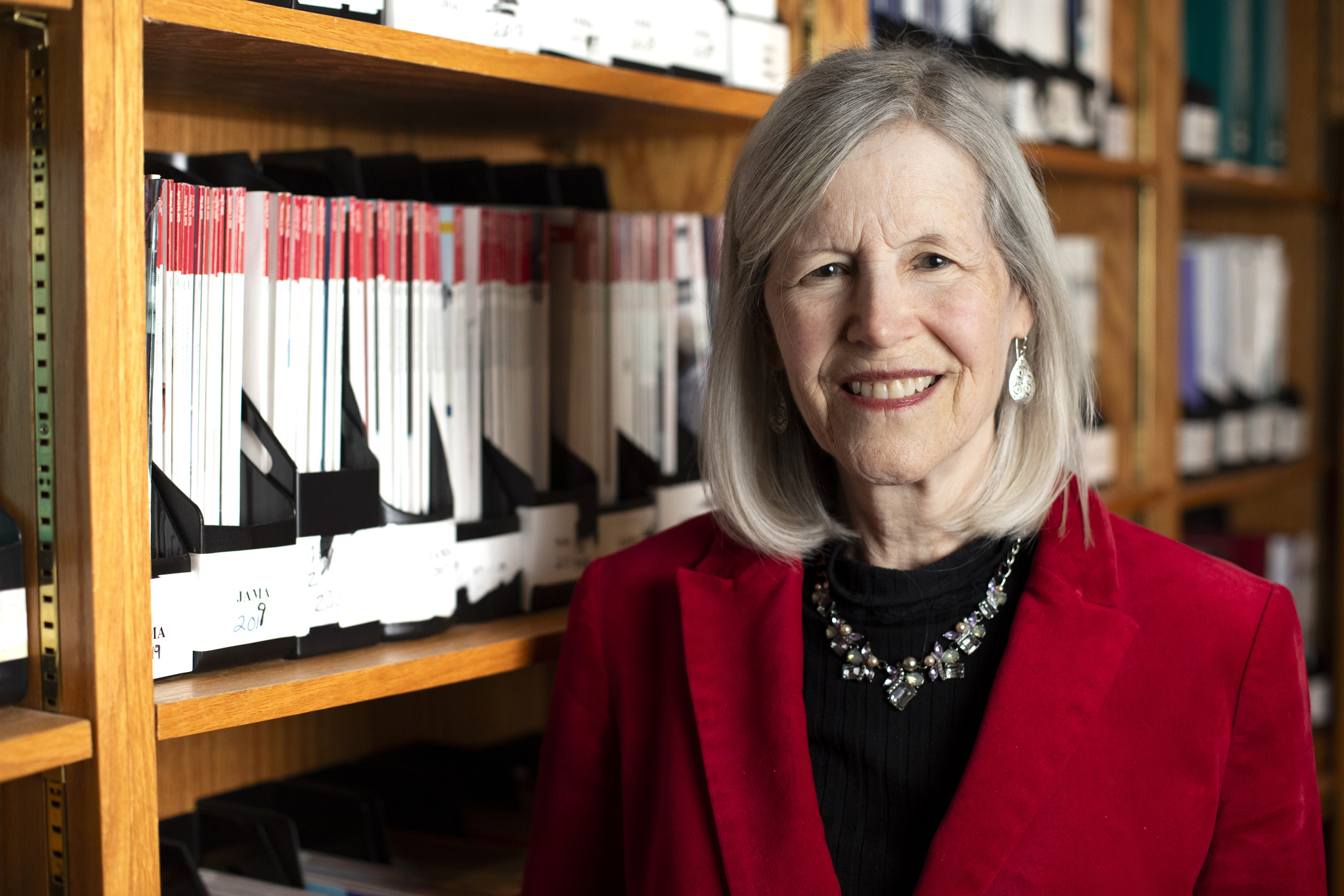Tips for staying alive, decades in the making
JoAnn Manson has spent her career researching – and highlighting – how everyday choices influence health

JoAnn Manson.
Veasey Conway/Harvard Staff Photographer
When it comes to the idea that prevention is the best medicine, JoAnn Manson doesn’t mess around.
Since the 1980s, Manson has dedicated her career to teasing out complex threads of human health, with an emphasis on factors under our control: physical activity, diet, sleep, smoking, alcohol consumption, medications such as menopausal hormone therapy, low-dose aspirin, statins, and, most recently, vitamins and other dietary supplements.
“Ever since my early years of medical training, I’ve been astounded by the powerful role of modifiable lifestyle factors as bulwarks against chronic disease,” said Manson, who is the Michael and Lee Bell Endowed Professor of Women’s Health at Harvard Medical School, chief of the Division of Preventive Medicine at Brigham and Women’s Hospital, and a professor of epidemiology at the Harvard Chan School. “I became motivated to devote my research career to testing interventions to reduce chronic disease burden, extend years of good health or ‘healthspan,’ and to try to decrease premature mortality.”
A scan of Manson’s publication history — one major database of medical research returns more than 1,800 hits on her name — reads like a list of national health headlines over the past 20 years: menopausal hormone therapy and cardiovascular disease and breast cancer; passive smoking in the workplace; walking versus vigorous exercise in prevention of heart disease; steps per day and cancer risk; pre-pandemic physical activity and COVID severity. A member of the National Academy of Medicine, she is listed by Research.com as the world’s top female scientist based on citation metrics, with more than 369,000 citations and an h-index, which reflects the scope and influence of her work, of 310.
Her tools have been major randomized prevention trials and large longitudinal studies that follow tens of thousands of people over time, gathering health, diet, and behavioral data, often augmented by blood, tissue, and other physical samples that enrich the picture and provide physical evidence of changes reported by participants. Many of these initiatives have received support from the federal government.
Manson’s research began with the landmark Nurses’ Health Study, which launched in 1976, when most study subjects were white males, and sought to fill gaps around women’s health. The decadeslong study, established by Brigham and Harvard investigators to explore links between contraceptive use, smoking, heart disease, and cancer, expanded over time to provide a broad view of lifestyle and health. Manson has been involved with the project since the mid-1980s and has been a principal investigator of the cardiovascular component for 26 years.
In 1993, Manson became one of the initial principal investigators of a National Institutes of Health-backed study called the Women’s Health Initiative, which enrolled 160,000 postmenopausal women in three large, randomized trials, along with an investigation of major causes of chronic disease and mortality in older women, including cardiovascular disease, cancer, and osteoporosis. Manson leads the study’s clinical center in Boston.
“Ever since my early years of medical training, I’ve been astounded by the powerful role of modifiable lifestyle factors as bulwarks against chronic disease.”
More recently, she has focused on what she has described as the “Wild West” of American healthcare — dietary supplements, whose health claims and distribution are unchecked and unregulated. In the nationwide VITAL randomized trial of 25,000 men and women 50 and older, she and colleagues investigated health claims about vitamin D and omega-3 fatty acids, reporting in 2018 that omega-3 fatty acids in fish oil were associated with a 28 percent reduction in heart attack. The effect was even higher among those who reported minimal fish in their diet, cutting risk about 40 percent. For vitamin D, there appeared to be little effect on heart disease, but a significant 17 percent reduction in advanced cancer, and a 22 percent reduction in autoimmune diseases.
A more recent randomized trial, COSMOS, the COcoa Supplement and Multivitamin Outcome Study, investigated links between cocoa flavanols — the major ingredient in dark chocolate — multivitamins, and health impacts, including effects related to cognition. In 2023 and 2024 it linked the humble daily multivitamin to benefits for cognitive aging and a reduction in cognitive decline, with consistent findings in three separate placebo-controlled studies in COSMOS.
Manson, like all health researchers, is keeping a wary eye on cuts to federal research funding. (A halt to support for the Women’s Health Initiative was reversed after an outcry.) Her own funding hasn’t been affected, though proposed cuts to indirect research costs would have a significant impact, as studies like VITAL and COSMOS have major infrastructure and blood repository costs. She’s concerned about cutbacks beyond her own division’s research, because they will have broad impact on science and prevention nationally, as well as on training programs and pipelines for future generations of scientists.
“It’s distressing what’s happening,” Manson said. “We’re very concerned, obviously, about our faculty and staff supported by federal funding, but it really goes far beyond the impact on any individual division or research program. It’s really the nationwide, and even global, impact on the scientific enterprise and population health.”





